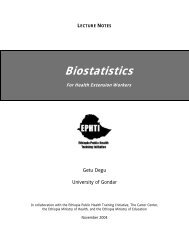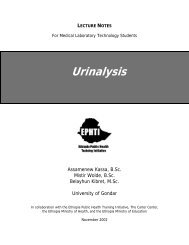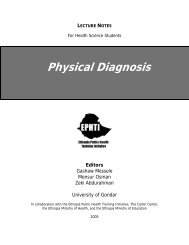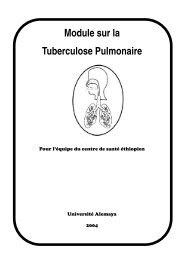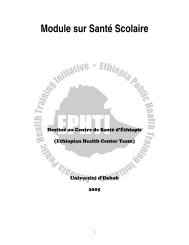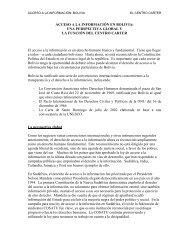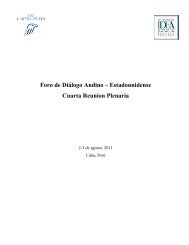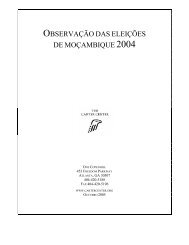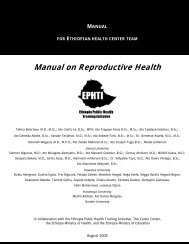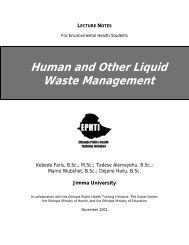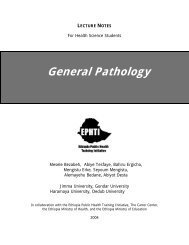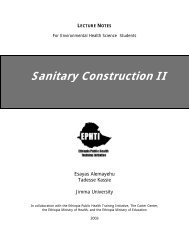- Page 1 and 2:
LECTURE NOTES For Nursing Students
- Page 3 and 4:
Preface This lecture note offers nu
- Page 5 and 6:
Acknowledgement My deepest apprecia
- Page 7 and 8:
2.3.5 Fallopian tube or uterne tube
- Page 9 and 10:
CHAPTER SIX : ABNORMAL PREGNANCY 12
- Page 11 and 12:
8.5 Subinvolution 225 Review Questi
- Page 13 and 14:
LIST OF FIGURES Figuer 1. Normal Fe
- Page 15 and 16:
ABBRIVATIONS ACTH Adreno cortico tr
- Page 17 and 18:
CHAPTER ONE INTRODUCTION Care of ch
- Page 19 and 20:
Hemorrhage, sepsis (infection), tox
- Page 21 and 22:
CHAPTER TWO ANATOMY OF FEMALE PELVI
- Page 23 and 24:
sacrum is concave and is referred t
- Page 25 and 26:
diamond in shape. The obstretrical
- Page 27 and 28:
Table 2 .Features of the four types
- Page 29 and 30:
The Fetal Skull The fetal head is t
- Page 31 and 32:
Regions of the Skull A. The occiput
- Page 33 and 34:
. Suboccipitofrontal 10cm from belo
- Page 35 and 36:
Figure 6 . Female external genitali
- Page 37 and 38:
Position:- In the non-pregnant fema
- Page 39 and 40:
• Round ligament - Ligaments form
- Page 41 and 42:
• provides a site for fertilizati
- Page 43 and 44:
maturation of reproductive organs a
- Page 45 and 46:
Thispain, called mitlelschmerz may
- Page 47 and 48:
2.5. The Breast Anatomy The female
- Page 49 and 50:
Amplulla: the widened-out portion o
- Page 51 and 52:
Review Questions 1. List different
- Page 53 and 54:
the ampullar portion. The functiona
- Page 55 and 56:
Blastocyst Trophoblast Inner cell m
- Page 57 and 58:
penetrate. Viruses, however, can cr
- Page 59 and 60:
Figure 10 . The fetal circulation (
- Page 61 and 62:
Appearance of the Placenta at Term
- Page 63 and 64:
Identification On inspection, the p
- Page 65 and 66:
Placenta infarction Placental infar
- Page 67 and 68:
Oarl cavity feels salivation Gums-
- Page 69 and 70:
• Creatinine and BUN decrease bec
- Page 71 and 72:
- Increase in the lower extermities
- Page 73 and 74:
- Lower part cervix and isthmus cha
- Page 75 and 76:
6. Fainting: - In early pregnancy f
- Page 77 and 78:
women feels it at 18-20 weeks the m
- Page 79 and 80:
Multipara a woman who has given bir
- Page 81 and 82:
The Obstetric History 1. Past Obste
- Page 83 and 84:
Breast Examination Asses the size,
- Page 85 and 86:
1.2 Fundal Palpation Purpose- To kn
- Page 87 and 88:
3. Deep pelvic Palpation: (3 rd Leo
- Page 89 and 90:
Auscultation: Check Fetal heart, ra
- Page 91 and 92:
• Rest at least 10 hrs at night a
- Page 93 and 94:
CHAPTER FOUR NORMAL LABOUR At the e
- Page 95 and 96:
- Labour is said to be established
- Page 97 and 98:
To assess progress of labour - Stat
- Page 99 and 100:
Relief of pain & promotion of comfo
- Page 101 and 102:
Uterine contraction - Frequency per
- Page 103 and 104:
advanced labour women may be assess
- Page 105 and 106:
Method - by abdominal palpation ide
- Page 107 and 108:
Eg. Partograph Name _______________
- Page 109 and 110:
- Caput - Sutures and Fontanelles.
- Page 111 and 112:
Echanism of Labour in a Normal Vert
- Page 113 and 114:
ERGOMETRINE: 0.5mgs. in a syringe w
- Page 115 and 116:
1. Separation of the placenta Mecha
- Page 117 and 118:
3. Controlled cord traction with ou
- Page 119 and 120:
Advantage: It allows the placenta t
- Page 121 and 122:
Inspect the umbilical cord a) Check
- Page 123 and 124:
Ergometrine Route Time to act Durat
- Page 125 and 126:
The guiding principles is to watch
- Page 127 and 128: B. Delayed cord clamping The cord c
- Page 129 and 130: - Method of delivery- spontaneous o
- Page 131 and 132: 4.4. Episiotomy Definition: The mak
- Page 133 and 134: 4. Lateral: The incision is begun o
- Page 135 and 136: Layers to be repaired 1. Vaginal wo
- Page 137 and 138: CHAPTER FIVE THE NORMAL PUERPERIUM
- Page 139 and 140: Lochia- discharge from the uterus d
- Page 141 and 142: 5.2 Management of the Puerperium An
- Page 143 and 144: answer her questions and through ou
- Page 145 and 146: CHAPTER SIX ABNORMAL PREGNANCY At t
- Page 147 and 148: One fetus may be died and be retain
- Page 149 and 150: Management of Pregnancy - Early dia
- Page 151 and 152: are labeled as ‘ Twin one ‘ and
- Page 153 and 154: a) Both twins presenting by the ver
- Page 155 and 156: - The urine will smell of acetone,
- Page 157 and 158: The liver is affected in sever case
- Page 159 and 160: Moderate - Preeclampsia is usually
- Page 161 and 162: Management during labour The nurse/
- Page 163 and 164: 35% with in the first few hours aft
- Page 165 and 166: - The volume of urine and the album
- Page 167 and 168: Type 1 placenta praevia - The major
- Page 169 and 170: Diagnosis - Using ultrasonic scanni
- Page 171 and 172: Complications • Post partam haemo
- Page 173 and 174: If the blood loss is revealed; More
- Page 175 and 176: - Rarely, Rhesus- isoimmunization -
- Page 177: The mother should rest in bed. An u
- Page 181 and 182: The degree of haemolysis and the nu
- Page 183 and 184: Transmission of infection to the fe
- Page 185 and 186: Post natal care Separation of the b
- Page 187 and 188: giving several short pushes during
- Page 189 and 190: - Maternal hyperglycemia should be
- Page 191 and 192: Review Questions 1. List the differ
- Page 193 and 194: All ill fitting part is associated
- Page 195 and 196: On auscultation The fetal heart bea
- Page 197 and 198: cord prolapse). - Sedation often ne
- Page 199 and 200: up gently delivery slowly taking 2
- Page 201 and 202: Diagnosis On palpation - the head i
- Page 203 and 204: Complications Maternal Fetal - Obst
- Page 205 and 206: make sure no cord prolapsed and to
- Page 207 and 208: If diagnosed during the first stage
- Page 209 and 210: Management Encourage the mother to
- Page 211 and 212: 7.2.1 Atonic Postpartum Hemorrhage
- Page 213 and 214: Cause - Delivery through partially
- Page 215 and 216: Management of Severe PPH in a Healt
- Page 217 and 218: Cause in 1 st stage 1) In-efficient
- Page 219 and 220: 4 Reduced pelvic out let. A forceps
- Page 221 and 222: - If the fetus is not alive and the
- Page 223 and 224: Methods of determining C.P.D. 1. De
- Page 225 and 226: 3 Placenta percrata- through muscle
- Page 227 and 228: 2. Tonic contraction and Bandl’s
- Page 229 and 230:
Condition of the baby - Usually sti
- Page 231 and 232:
3. Control head, keep it flexed, so
- Page 233 and 234:
Review Questions 1. What are the co
- Page 235 and 236:
More severe infection may consist o
- Page 237 and 238:
Prevention The best method of treat
- Page 239 and 240:
Managing Puerperal sepsis 1. Isolat
- Page 241 and 242:
8.5 Subinvolution Sub involution is
- Page 243 and 244:
CHAPTER NINE INDUCTION OF LABOUR At
- Page 245 and 246:
Table 6 .Bishops Score System Induc
- Page 247 and 248:
- Fluid balance chart - Urine test
- Page 249 and 250:
Nipple stimulation, which releases
- Page 251 and 252:
Conditions in which trial of scar i
- Page 253 and 254:
CHAPTER TEN OBSTETRIC OPERATIONS At
- Page 255 and 256:
Indication for forceps delivery - F
- Page 257 and 258:
In the infant: Bruising: Severe bru
- Page 259 and 260:
10.2 Caesarean Section Caesarean se
- Page 261 and 262:
Possible indications include: - The
- Page 263 and 264:
types of decapitating hooks and kni
- Page 265 and 266:
procedure is extremely rare in cont
- Page 267 and 268:
- The head must be engaged. - The w
- Page 269 and 270:
CHAPTER ELEVEN CONGENITAL ANOMALIES
- Page 271 and 272:
A single remiuterus results when on
- Page 273 and 274:
E. Persistence of male (Wolffcan) d
- Page 275 and 276:
CHAPTER TWELVE INFECTION OF THE FEM
- Page 277 and 278:
Sign Major Minor Cervical motion Ab
- Page 279 and 280:
- Gentamycin iv or in loading dose
- Page 281 and 282:
In those persons with recurrent les
- Page 283 and 284:
Presentation Sign and symptom A wom
- Page 285 and 286:
Risk Factor Studies have indicates
- Page 287 and 288:
ecto vaginal fistula. Other types m
- Page 289 and 290:
12.6 Prolaps of the Uterus A descen
- Page 291 and 292:
- If no symptoms are present and th
- Page 293 and 294:
Forced inversion caused by excessiv
- Page 295 and 296:
therapy may be initiated to prevent
- Page 297 and 298:
Local disorders of the genital trac
- Page 299 and 300:
. Missed abortion This is the term
- Page 301 and 302:
The membranes may have ruptured and
- Page 303 and 304:
operation. Many mothers do not make
- Page 305 and 306:
I. Septic abortion Infection may oc
- Page 307 and 308:
Dysmenorrhea Definition-Dysmenorrhe
- Page 309 and 310:
esult from tension, anxiety (stress
- Page 311 and 312:
Implantation may occur in the fimbr
- Page 313 and 314:
the rupture is on the mesenteric si
- Page 315 and 316:
Diagnosis - The presence of interna
- Page 317 and 318:
Causes of infertility Female - Vagi
- Page 319 and 320:
Benign A. Fibrocystic breast diseas
- Page 321 and 322:
- Pain in the breast - Blood staine
- Page 323 and 324:
Treatment - Oestrogen - Progesteron
- Page 325 and 326:
E. Gently squeeze the nipple of eac
- Page 327 and 328:
- Poor uterine contraction - Subinv
- Page 329 and 330:
cervical canal and are multiple. Th
- Page 331 and 332:
Vulval Cysts Bartholin’s cyst- It
- Page 333 and 334:
GLOSSARY Abortion Termination of pr
- Page 335 and 336:
Intra uterine growth retardation Fe



